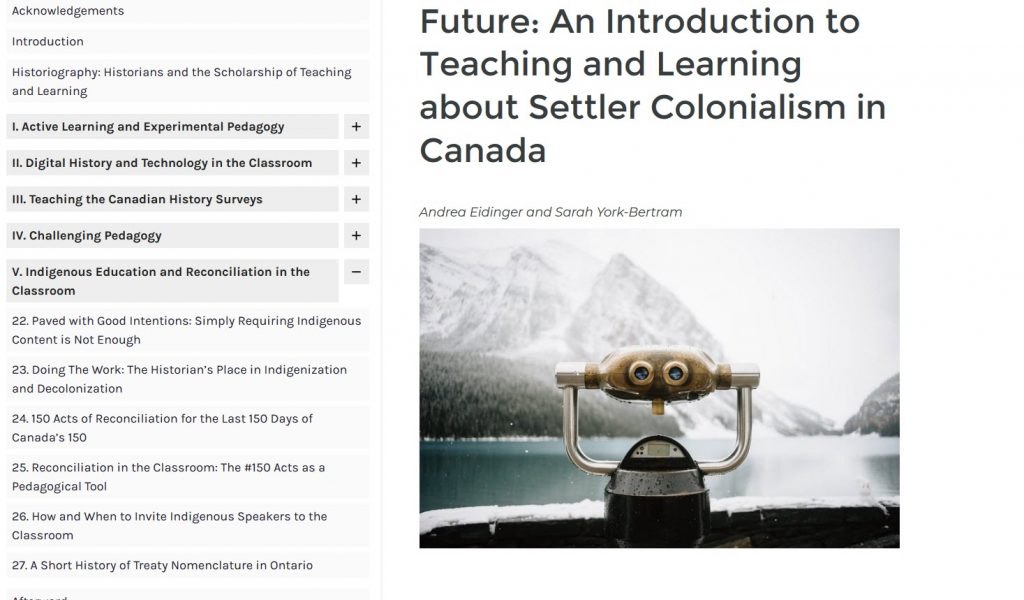Weaving Indigenous Ways of Thinking/ Practice into your Curriculum
The TRC report contains a number of calls for action, in which the commission calls upon the governments in Canada to provide adequate funding for post-secondary institutions so that teachers can get educated on how to integrate Indigenous knoewledge and teaching methods into the classrooms. The president Mike Mahon explicitly states how the U of L “recognize[s] the importance of our Indigenous community here in Lethbridge and around southern Alberta.” (1)
Since its inception in 1967, the University of Lethbridge has valued its location on traditional Blackfoot territory. In 1975, a department of Native American Studies was formed and since that time many Faculties and Units across campus have undertaken programs and initiatives to support Blackfoot and First Nations Metis and Inuit (FNMI) people, on which you can read up on here.
If you are looking for ways of introducing indigenous topics into your teaching, you might want to start with Beyond The Lecture: Innovations in Teaching Canadian History, an open textbook recently published by Andrea Eidinger and Sarah York-Bertram (eds.), who invited the contributor to share their ideas how you can decolonize your classroom. In five different thematic sections, an issue in the field of Canadian history education is addressed and examples are provided relating to active learning and experimental pedagogy; digital history and technology in the classroom; teaching the Canadian history surveys; challenging pedagogy; and Indigenous education and reconciliation in the classroom. Although written by Historians, it is applicable across all disciplines, especially with regards to the chapters 4 and 5, which might impact/ inspire your own teaching.
We are currently compiling resources designed to embed indigenous ways of knowing and teaching practices into academic curricula and classrooms. While we are building the collection, we will determine a shared space for you to access. Until then, please refer to the short reference list below:
BCcampus. (n.d.). Indigenization guides – BCcampus. Retrieved April 20, 2020, from https://bccampus.ca/projects/indigenization/indigenization-guides/
First Nations Pedagogy Learning Centre. (n.d.). First Nations Pedagogy Online. Retrieved June 18, 2020, from http://firstnationspedagogy.ca/index.html
Historica Canada Education Portal. (n.d.-a). Indigenous Arts & Stories Teacher’s Kit. Retrieved June 18, 2020, from http://education.historicacanada.ca/en/tools/432
Historica Canada Education Portal. (n.d.-b). Indigenous Perspectives Education Guide. FlippingBook. Retrieved June 18, 2020, from https://fb.historicacanada.ca/education/english/indigenous-perspectives/
Historica Canada Education Portal. (n.d.-c). Over 290 Learning Tools for Educators. Retrieved June 18, 2020, from http://education.historicacanada.ca/
Historica Canada Education Portal. (n.d.-d). Treaties in Canada. Retrieved July 7, 2020, from http://education.historicacanada.ca/en/tools/260?c=17
Home | The Canadian Encyclopedia. (n.d.). Retrieved June 18, 2020, from https://www.thecanadianencyclopedia.ca/en
Indigenous Perspectives Education Guide | Historica Canada Education Portal. (n.d.). Retrieved July 7, 2020, from http://education.historicacanada.ca/en/tools/493
Aboriginal Arts & Stories. Teachers’ Kit Learning Tool.pdf. (n.d.). Retrieved July 7, 2020, from http://education.historicacanada.ca/files/286/EN_AAAS_TeachersKit_FINAL.pdf
Talking Together. (n.d.). Talking Circle: Fact Sheet. Retrieved June 18, 2020, from https://www.learnalberta.ca/content/aswt/talkingtogether/facilitated_talking_circle_fact_sheet.html
The Canadian Encyclopedia. (n.d.). Indigenous Peoples (Collection). Retrieved June 18, 2020, from https://thecanadianencyclopedia.ca/en/collection/aboriginal-peoples


